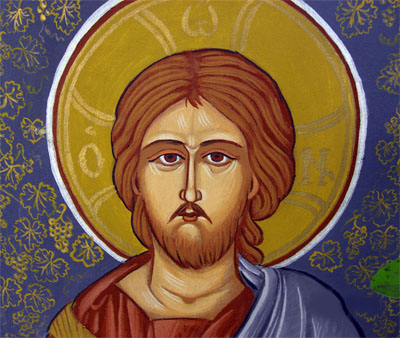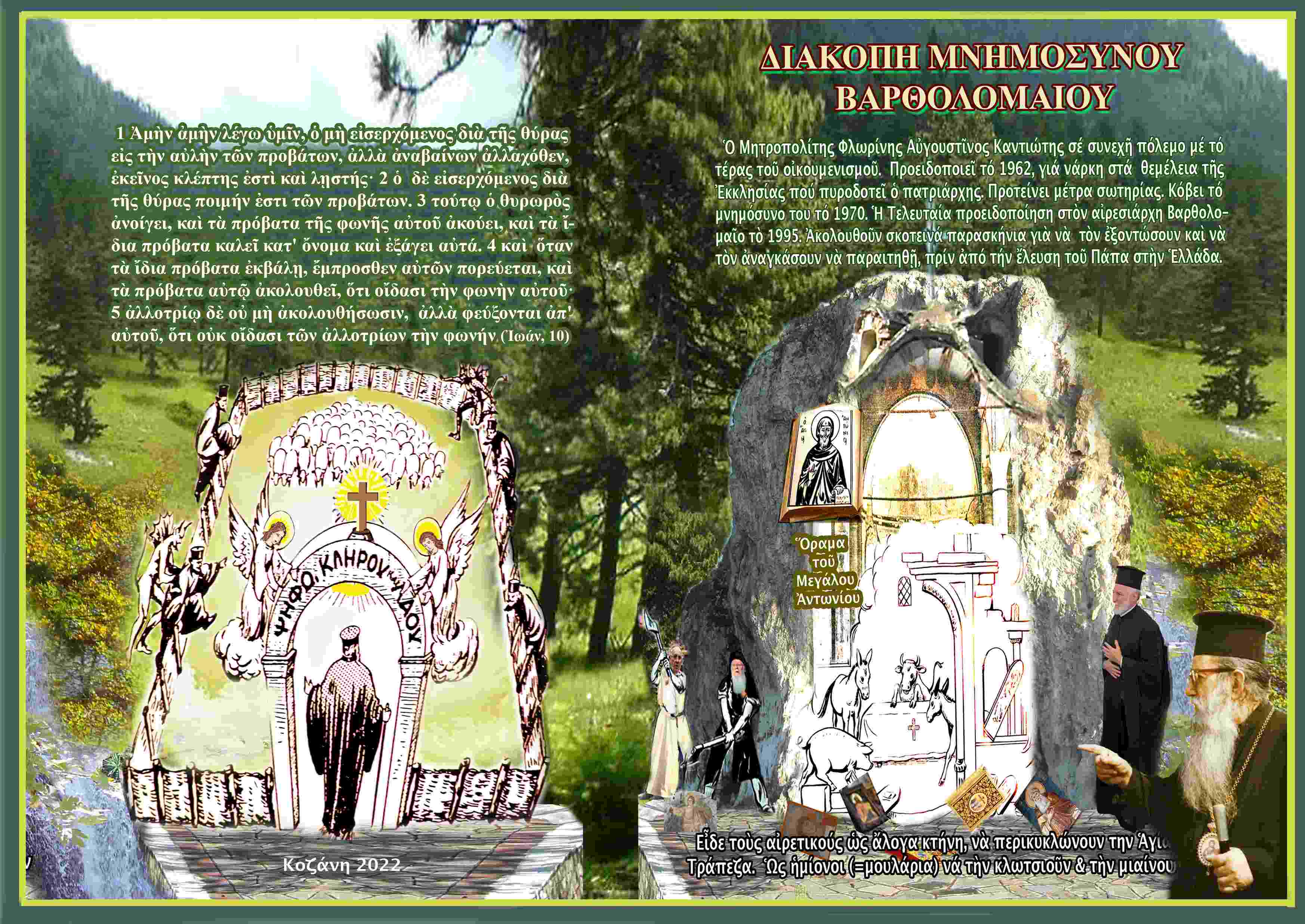Απόσπασμα από τό βιβλίο του πατρός Αυγουστίνου «Είς τήν Θείαν Λειτουργίαν, Πρακτικαι Ομιλίαι»!
Ομιλία 2
ΠΙΣΤΕΥΩ…
Η μετάφραση του βιβλίου «Είς τήν Θείαν Λειτουργίαν», (δύο τόμους) στα Αγγλλικά έγινε από τον ακούραστο εργάτη και αγωνιστή της Ορθοδοξίας, πνευματικόν τέκνον του π. Αυγουστίνου, πατέρα Αστέριο Γεροστέργιο.
Προσφέρεται ταπεινά με την έν Χριστώ αγάπη εις ψυχικήν ωφέλειαν των απανταχού της γής Ορθοδόξων Χριστιανών καί των επισκεπτών της ιστοσελίδας του σεβαστού Γέροντος Αυγουστίνου πρός δόξαν του Τριαδικού μας Θεού.
I BELIEVE…
 In our last homily, we spoke generally about the Symbol of our Faith, the creed, which is recited at every Divine Liturgy. The Creed is a short statement of the truths that every pious Christian should believe. Because it is short, even those with little formal education can learn and recite it by heart.
In our last homily, we spoke generally about the Symbol of our Faith, the creed, which is recited at every Divine Liturgy. The Creed is a short statement of the truths that every pious Christian should believe. Because it is short, even those with little formal education can learn and recite it by heart.
In the past, when faith was alive, not only educated people, but even shepherds and peasants listened to the Creed with great reverence, and considered it an honor to recite it in Church. They enjoyed hearing or saying the Creed, that sweet melody of the Holy Spirit. Children took pride in learning and reciting it by heart. Christians attending the Devine Liturgy blessed the parents of those children, who like angels, recited the sacred Symbol in their clear, unaffected voices.
That was then – but what about now? A pious priest once told me that some time ago in his parish, a scandal occurred because a man wanted to become a godparent of a child who was about to be baptized. The priest asked the godfather to recite the Creed, but the man said that he did not know it. So the priest gave him the book so he could read it, but he refused to do this. He was ashamed to read the Creed, and audaciously told the priest he didn’t want to read the Creed. See what we are reduced to! Unbelieving people want to become god-parents in sacramental services…
In our diocese, we issued an encyclical ordering priests to advise parents not to accept as godparents people who do not believe, or have cause scandal. Only people who truly believe and live according to God’s commandments are to be godparents for people who themselves believe and live the Creed and try to convey it to the children they baptize. Priests and parents who accept non-church goers as godparents commit a big sin, because they make a mockery out of the Mysteries and allow pearls to be thrown to swine.
The Creed is a short statement of our Orthodox Faith, as we have said. It consists of 714 words in Greek, and each word has its own deep significance. An attempt to discuss the entire content of the Creed would result in many homilies. It would end up as another whole book. A brilliant preacher and author, Konstantinos Kallinikos, of blessed memory, wrote a very important book with the title “The Foundations of the Faith”, which in 31 lessons interprets and analyzes each article of the Creed. This book we recommend especially to teachers, professors, and scientists. They will find in it an excellent apology of the truths of our Faith. But here, we will endeavor to explain the content of the Creed in a few sermons.
The first words of the sacred Symbol of Faith are “I believe”. Let’s take a few everyday examples to help us understand what “belief” is, because belief (faith) is not only necessary for religious life, but even for daily worldly existence itself.
You are a stranger in a city. Noontime comes, and you are hungry. You enter one of the many restaurants and are given a meal, cooked by a cook you do not know. You eat it with pleasure, but also with faith, that is with confidence, because you yourself didn’t see the materials with which the cook prepared the meal, and you didn’t watch its preparation from beginning to end. You eat the food, however, having faith – confidence – in the restaurant’s owner. If you didn’t have faith in him then you would never have sat down to eat in his restaurant.
You walk somewhere by yourself. You want to go to a place some distance away, but you don’t know the way. You meet a stranger and ask him, and in a kindly manner he shows you the way. You have faith, confidence in what the stranger tells you, and you go as he directed you.
Now, you want to travel by car, train, or airplane. You don’t know who the drivers or pilots are. Yet in spite of that, you enter the vehicle without investigating their capabilities, believing in them.
Another example. You fall sick and call the physician. He gives you a prescription to buy some medicines. And you, having faith in the doctor, follow his instructions; again, having faith in the pharmacist, you buy some his medicines.
These examples, and many more, show that even in worldly matters, nothing can be done without faith. If faith were removed, all human activity would cease. Even the sciences would come to a halt: based on experiment, they will not be able to make any progress, since they begin their research on certain principles not yet proven, and they build the rest of their scientific investigations on these.
We live by faith. We believe in bakers and cooks. We believe in drivers of trains and airplanes. We believe in teachers and professors. We believe in scientists, diplomats and politicians. We believe in everything and everybody, only we do not want to believe in God.
Credulous to all, faithless and unbelieving in God!
O Disbelief! A philosopher of the ancient world, discussing the strangeness of human behavior, said that we believe in those people and things we should not believe in, and disbelieve in the people and things we should believe in, thereby bringing great calamity to the world. How right he was! It would be enough to show the horrible state to which entire nations fell when they put their trust in persons and thing that, in the end, deceived them and led them into great catastrophes.
The faith of the Christians, however, is not like faith of worldly men, who put their trust in people and worship idols and fantasies. The Christian knows in whom he believes. An out of the mire of unbelief, he cries aloud his belief: “I believe in one God, the Father almighty, Maker of heaven and earth, and of everything visible and invisible…”
This chapter was taken from the book “ON THE DEVINE LITURGY – VOL.2” by Bishop Augoustinos N. Kantiotes.
e-mail: ibmgs3@verizon.net
www.orthodoxinfo.com/ibmgs
 Δεκ 14th, 2009 |
Δεκ 14th, 2009 |  Filed under: English
Filed under: English

 In our last homily, we spoke generally about the Symbol of our Faith, the creed, which is recited at every Divine Liturgy. The Creed is a short statement of the truths that every pious Christian should believe. Because it is short, even those with little formal education can learn and recite it by heart.
In our last homily, we spoke generally about the Symbol of our Faith, the creed, which is recited at every Divine Liturgy. The Creed is a short statement of the truths that every pious Christian should believe. Because it is short, even those with little formal education can learn and recite it by heart.
Add A Comment
You must be logged in to post a comment.